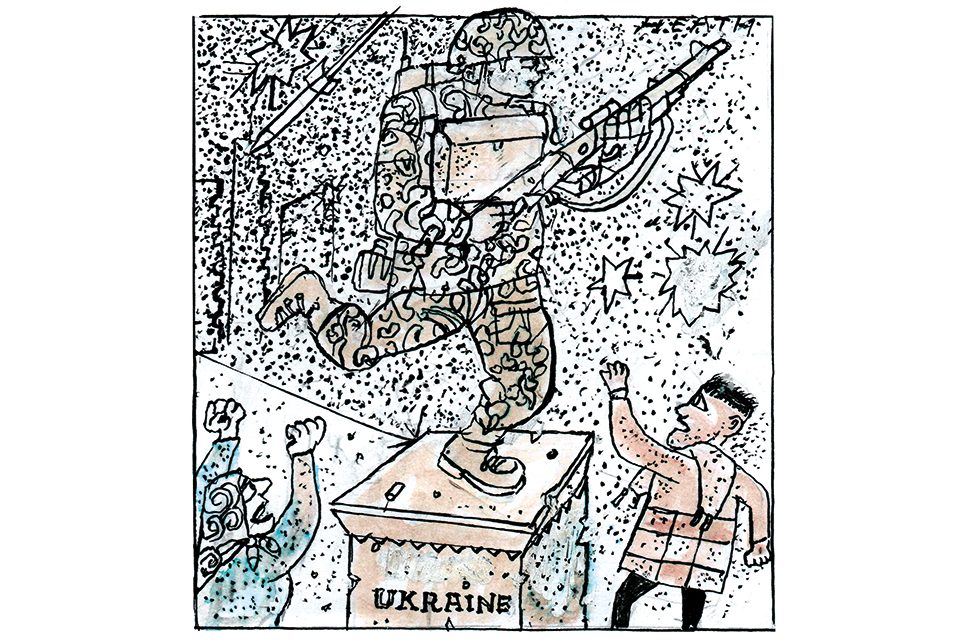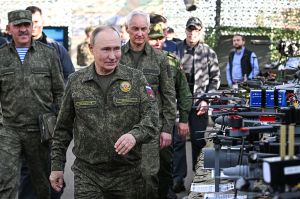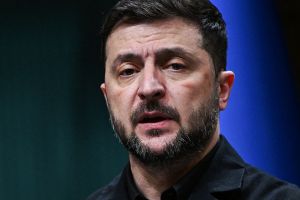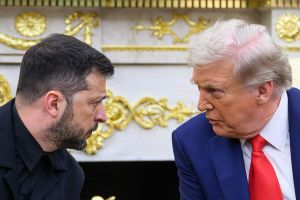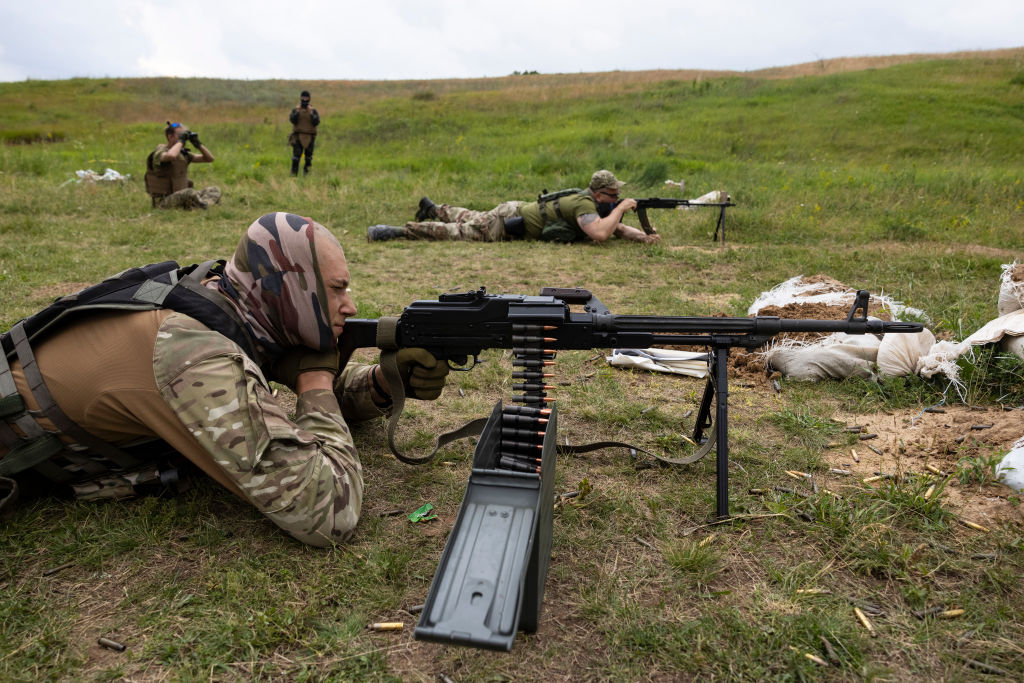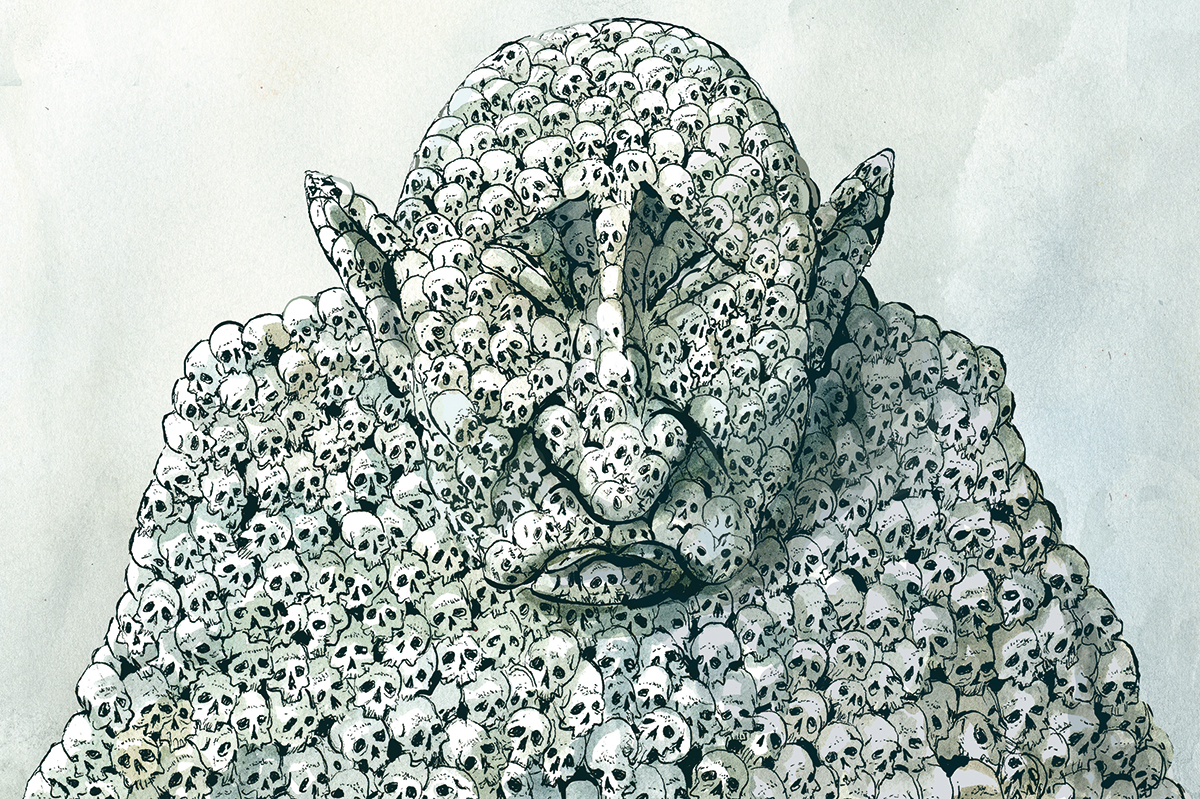What better cocktail to try in Kyiv than “Lesya Ukrainka’s Dream?” Born in 1871, Ukrainka was a fierce feminist, poet, titan of Ukrainian literature and the angel-faced symbol of independent nationhood. In this time of war, writers like Ukrainka and Taras Shevchenko, the great nineteenth-century poet persecuted by the Russians, a man who has come to define Ukrainian national identity and liberation, are all the rage. The last verse of Ukrainka’s poem “Contra Spem Spero” (“I Hope Against Hope”) captures the national mood:
Yes, I will laugh despite my tears,
I’ll sing out songs amidst my misfortunes;
I’ll have hope despite all odds, I will live!
Away, you sorrowful thoughts!
Tonight, in the Kyiv-meets-Williamsburg minimalism of 100 Rokiv Tomu Vpered, a startlingly hip restaurant, Ukrainka lends her name to a delicious blend of porcini-infused rum, baked-apple-tinged vermouth and spicy bitters. It seems only patriotic to have another.
While soldiers fight, tech startups thrive. Ukraine does a mean line in coders, cyber warriors, hackers and developers. Homegrown successes include Grammarly, the writing assistant; GitLab, a hub for 30 million software engineers; and Reface, the face-switching app which reached 100 million downloads in half the time it took TikTok. Cyberaccelerator UA, a three-month program, has helped dozens of cybersecurity companies launch since 2021, and miltech is now one of the most dynamic sectors. Nice work, Moscow. In the pared-back co-working space of Kooperativ I join a hybrid meeting linking intrepid venture capitalists, incubators and a car insurance startup in London, Kyiv and Lviv. “Kyiv has become the point for startup resistance,” says Denis Gursky of 1991 Accelerator, an incubator that supports these IT warriors. “It’s a place where the progressive spirit of tech-savvy youth resists being drawn into the dark future filled by the greedy political ambitions of Russia. This is the collision of two worlds: Ukrainian democracy and freedom, and Russian command-driven, Soviet-style dictatorship.” Innovation 1, rockets 0.
I’m in Kyiv with a friend to deliver an ambulance close to the deadly front line at Bakhmut. From Harlingen in Holland it’s 1,700 miles as the crow flies. We power across the Silesian plains, mistletoe-crowned lime trees thrusting through the watery sunlight. After dipping into the Carpathian Mountains, where lazy Polish border guards loaf around, it is mile after horizon-stretching mile of Ukraine’s fabled Black Earth steppe.
When it comes to saving Ukrainian soldiers’ lives, all roads lead to MOAS (Migrant Offshore Aid Station). Several years ago, the humanitarian organization was rescuing migrants in the Mediterranean. These days it runs highly skilled ambulance teams of doctors and paramedics behind the eastern front lines. “Before we got involved last year, the death rate was 70 percent,” says Chris Catrambone, Louisiana-born entrepreneur, humanitarian and founder of MOAS. His all-Ukrainian teams transport wounded soldiers from rudimentary field hospitals to large city hospitals in Dnipro, Zaporizhzhia and Kharkiv. “We’ve saved 12,000 lives now and we’ve only lost one,” Catrambone says. Within the massive structure of international support to Ukraine, things fall between the cracks. The US has provided $35 billion in security assistance to Ukraine since last year’s invasion. This includes thirty-eight Himars advanced rocket systems, more than 1,600 Stinger and 10,000 Javelin missile systems, twenty Mi-17 helicopters and thirty-one Abrams tanks. What neither Washington nor London’s humanitarian programs will apparently fund is the provision of life-saving medical assistance to wounded Ukrainian soldiers, on the grounds that they are soldiers and it’s all too risky. It’s a bureaucratic, computer-says-no nonsense. The counter-argument is that as soon as a soldier is wounded, he or she is no longer a combatant and is entitled to care according to the Geneva Conventions. Maybe Samantha Power, the USAID boss, could reconsider? MOAS has had to rely instead on the generosity of individual donors and needs urgent funding to maintain its operations. Readers who wish to support this important work can find out more at moas.eu.
We drop off the ambulance a few miles from Bakhmut. The rolling barrage of artillery rumbles away over the trenches, where it’s World War One all over again. Blood-soaked stretchers line the entrance to one small hospital where the mood, as everywhere, is defiant. “This is our land. Of course we will fight,” says Fedir, a doctor who returned from Israel to support the war effort. “We amputated the leg of a soldier the other day. He said to me: ‘Just give me a prosthetic and I’m going back to fight the Russians.’” Gallows humor is alive and well. A soldier stumbles out of the operating theater, head wrapped in white bandages with two yellow discs covering his eyes. “He was stung by a radioactive bee,” the doctor says, triggering two medics to howl with laughter. “He may lose his eyesight,” he adds quietly. If the joking sounds callous, the film he shows me on his phone of a recent operation turning a soldier’s insides from a bullet-mangled casserole to neatly trussed liver and innards is evidence of the extraordinary care being provided here. No one would swap places with a wounded Russian soldier.
On the train to Warsaw we get talking to a Ukrainian teen. He says he has three brothers fighting in Bakhmut. The chances of all three surviving the meat grinder must be slim to none, but there is no let-up in defiance. “We’ll fight till the last Russian leaves,” he says.
This article was originally published in The Spectator’s UK magazine. Subscribe to the World edition here.



